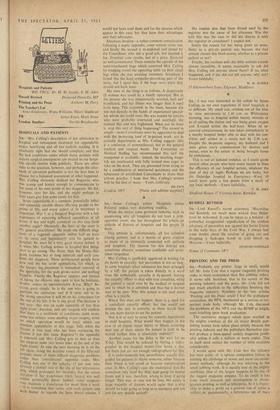Hospitals and Patients
'BM. FRCS,' Dr. M. M. Sandie, E. M. Adey Russell Revised Desmond Donnelly, MP Printing and the Press Anthony M. Perry
The Teacher's Lot
Anne hinderslcy, Wena Williams, Hilary Stanhope
PR James Ennis. Mark Stone
London Sundays Neville Braybrooke HOSPITALS AND'PATIENTS
SIR,—Mrs. Catling's description of her admission to hospital and subsequent treatment for appendicitis makes horrifying and all too realistic reading. It is absolutely right that she should complain, and that the bad conditions under which many patients with serious surgical emergencies are treated in our hospi- tals should receive wide, publicity. There are other sides to the question, however, and perhaps the after- math of advanced peritonitis is not the best time to choose for a balanced assessment of what happened. Mrs. Catling obviously disliked her Registrar, who was young and honest enough to communicate to her some of his own doubt of her diagnosis. He did, however, save her life, and she might perhaps in later years give him some credit for that, Acute appendicitis is a common, potentially lethal and eminently curable illness affecting people in the prime of life, and every aspect of its treatment is important. May 1, as a Surgical Registrar with a fair experience of removing inflamed appendices ,at all hours 'if day and night, comment on this case from another angle? Obviously, the hero of 'the story is the general practitioner. He made the difficult diag- nosis of a ruptured appendix within half an hour of its onset and immediately sent his patient to hospital. He must be a very good doctor indeed. It Is when Mrs. Calling arrives in hospital that things start to go wrong. The Sister. then the House Stir- geon, examine her at long intervals and each con- firms the diagnosis. Three professional people have new said she has acute appendicitis.•-for which, as she knows. the .treatment is immediate removal of the appendix. yet the pain grows:worse and nothing haPPens. Finally the Registrar appears and instead of taking the obvious step open to him fie.heSitates, doubts, orders an uncomfortable X-ray. Why? Be- cause, - quite simply. he is the one who is going to perform the operation. and if it turns out to be the wrong operation it will be on his conscience for the rest of his life. if he is any good. The decision is not easy--this was an acute appendix of less .than eight hours' duration, and any surgeon will confirm that there is a multitude of conditions, some more, Some less serious, some needing major surgery, some on which operation would be fatal, which can simulate appendicitis at this stage. Still, when the theatre. is free (and who has been occupying the theatre if not this same Registrar?) the appendix is removed and Mrs. Catling gets to bed, as does her surgeon some two hours later at the end of his night round. At nine the next morning he is on the lob again, doing the daytime round of his fifty-odd patients, many of them difficult diagnostic problems rather than 'convalescent' appendix cases. Mrs. Calling was one of the unlucky 15 per cent. who develop a clotted vein at the site of her intravenous drip, which prolonged her recovery, but the actual duration of her transfusion (sixty hours) was well within permissible limits. Indeed, some surgeons 1`1Y maintain a transfusion for more than a week — i it s. something that varies with each patient and
each doctor. As regards the linen thread sutures, I would not have used them and for the reasons which appear in this case, but they have their advantages and their advocates.
Abscesses develop—a rather common complication following a septic appendix, some sutures come out, and finally the wound is re-explored and closed by the Consultant, who did a good job, but exacted a fee. Eventual cure results, but at a price, financial as well asemotional.There remains the episode of the semi-translucent bugs which unnerved Mrs. Catling by trudging round the operating table on their small legs while she was awaiting treatment. Somehow I 'found this the least, sympathy-provoking part of the story, bUt 1 agree' that if the hugs were there they should not have been.
My view of the thing is as follows. A desperately ill woman was saved by a timely operation. But in the process she was unnecessarily worried, huri and humiliated, and her illness was longer than it, need have been. This occurred, in the main, because she was not directly in the hands of experienced special- ists whom she could trust. She was treated by juniors who were probably overtaxed and overtired. she realised this and was frightened. What can be done ts• stop this sort of thing happening? The answer is simple—more Consultants must be appointed to deal
with the increasing load of in-patient work, not to casualty departments as Mrs. Catling suggests (this
is a confusion of nomenclature), but to the general
medical and surgical wards. The Committee on Medical Staffing has recommended this and the manpower is available: indeed, the teaching hospi- tals are overloaded with fully trained men eager to take on the work. They are prevented from doing so
by a combination of ministerial parsimony and the reluctance of established Consultants to shtire their private practice. 1 hope that Mrs. Calling's protest will be the first of many.—Yours faithfully,
BM, FRCS
London, SW7 [Name and address supplied.]














































 Previous page
Previous page